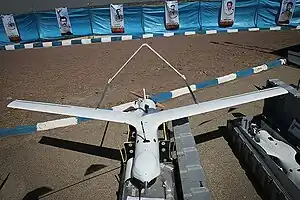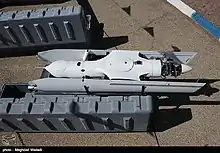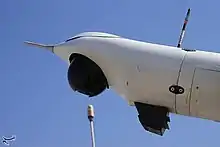Qods Yasir
The Qods Yasir (Persian: یاسر), also known as the Sayed-2, is an Iranian light tactical surveillance and reconnaissance unmanned aerial vehicle (UAV)[2] manufactured by Qods Aviation.[3] It is ostensibly an unlicensed copy of an American Boeing Insitu ScanEagle drone captured and reverse-engineered by Iran, but has some design changes.
| Qods Yasir | |
|---|---|
 | |
| Role | Unmanned aerial vehicle |
| National origin | Iran |
| Designer | Qods Aviation Industry Company |
| Introduction | September 28, 2013[1] |
| Status | in production and in service |
| Primary users | |
| Produced | 2013–onwards |
| Developed from | Boeing Insitu ScanEagle |
Iran captured a Scaneagle in December 2012 and the Qods Yasir was unveiled about ten months later, in September 2013.[2] The Yasir's only state operators are Iran and Syria. It has been exported to at least one non-state actor and is alleged to have been exported to several more.[2]
Yasir UAVs have been used by Iranian allies in the civil wars in Iraq and Syria, likely because of their small footprint compared to larger Iranian UAVs.[4]
Development
.jpg.webp)
In 4 December 2012 Iran said it had captured an American Boeing Insitu ScanEagle that violated its airspace over the Persian Gulf.[5] The U.S. Navy stated that none of its ScanEagles were missing.[6] However, there are other ScanEagle operators in the Middle East. Later that month, on 17 December 2012, Iran amended their claim to three ScanEagles[7] and said they would attempt to reverse engineer and mass produce the ScanEagle.[8] Bizarrely, Iran also claimed that they had already reverse-engineered, mass produced, and entered the ScanEagle into service.[7] The UAV was unveiled to the media in September 2013 when it entered service and received the name "Yasir."[1]
In October 2013, the IRGC presented Russian Air Force Commander Lieutenant General Viktor Bondarev with a Yasir drone as a gift.[9]
Design
The Yasir has swept back wings and a large payload bubble under its nose. Unlike the ScanEagle, it has an inverted V-tail and a twin-boom empennage. The Yasir has a single, unidentified, two-bladed propeller engine.[2] It carries an electro-optical payload.[10] It can also be fitted with an explosive payload for use as a disposable strike munition.[11]
The Yasir is 1.19 meters long, has a wingspan of 3.05 meters, and weighs 18 kg.[12] This is similar to, but slightly smaller than the ScanEagle.[13] It has a speed of 120 km/h, a max endurance of 20 hours, a 16,000 ceiling, and a communications link distance of up to 100 km.[14]
Operational history

Iran
At least some Yasirs are located at Iran's Qeshm Island drone base.[15]
Lebanon
Following the repetitive flying in early 2014 of an unidentified UAV over Lebanese Forces leader Samir Geagea's Ma'arab complex, MP Antoine Zahra accused Hezbollah of flying a Yasir UAV in order to monitor and possibly assassinate Geagea. Israeli sources say Hezbollah has flown Yasir UAVs as well.[16]

.jpg.webp)
Iraq
The Iraqi Shia militia Harakat Hizballah al-Nujaba has received six Yasir UAVs.[17] Kataib Hezbollah has also reportedly received the Yasir UAV, though they rarely use it.[17] The Shiite militia "Jund al-Imam Ali" has also apparently received Yasir UAVs.[17]
Operators
Non-state operators
- Harakat Hezbollah al-Nujaba
 Hezbollah (alleged)
Hezbollah (alleged) Kata'ib Hezbollah (alleged)
Kata'ib Hezbollah (alleged)- Kata'ib al-Imam Ali (alleged)
Specifications
Data from Drones Operating in Syria and Iraq[2] and Tasnim News
General characteristics
- Crew: none
- Length: 1.19 m (3 ft 11 in)
- Wingspan: 3.05 m (10 ft 0 in)
- Gross weight: 19 kg (42 lb)
- Propellers: 2-bladed
Performance
- Cruise speed: 120 km/h (75 mph, 65 kn)
- Endurance: 8 h or 20 h
- Service ceiling: 4,600 m (15,000 ft)
See also
- Iran–U.S. RQ-170 incident – An earlier and similar incident of an American UAV captured by Iran.
References
- "Iran has unveiled a new drone based on a captured U.S. Boeing ScanEagle". 29 September 2013.
- Gettinger, Dan (December 2016). "Drones Operating in Syria and Iraq" (PDF). Center for the Study of the Drone at Bard College.
- "YASIR ( يسير ) أرشيف معرض الأمن والدفاع 2017 / بغداد". twitter. 4 Oct 2017.
- Ahmad, Naveed (2 June 2019). "The Advent of Drones: Iran's Weapon of Choice" (PDF). International Institute for Iranian Studies (Rasanah).
- "Iran broadcasts footage 'extracted from CIA spy drone'". The Guardian. London. 7 February 2012. Retrieved 31 January 2014.
- Erdbrink, Thomas (4 December 2012). "U.S. Navy Denies Iran's Claim to Have Captured Drone". New York Times. Retrieved 31 Jan 2014.
- "Iran says it captured two more U.S. drones before ScanEagle". Haaretz. 17 December 2012. Retrieved 31 January 2014.
- "Iran says it will produce ScanEagle-type drone". UPI. Retrieved 31 January 2014.
- "Iran gives Russia copy of US ScanEagle drone as proof of mass production". theguardian.com. 21 October 2013. Retrieved 31 January 2014.
- Anthony H. Cordesman, with the assistance of Scott Modell, Aaron Lin, and Michael Peacock (October 7, 2014). "Iran's Rocket and Missile Forces and Strategic Options" (PDF). Center for Strategic and International Studies. Archived from the original (PDF) on October 18, 2017. Retrieved September 13, 2018.
{{cite web}}: CS1 maint: multiple names: authors list (link) - "Senior Army Commander: Iran Turns Yasir into Suicide Drone". Tasnim News Agency. 6 January 2015.
- "تکرار/ کلکسیون پهپادهای غنیمتی سپاه از آمریکا + عکس- اخبار سیاسی - اخبار تسنیم - Tasnim".
- "Janes | Latest defence and security news".
- "خبرگزاری تسنیم - پیشرفت شگرف ایران در عرصه پهپادی/ نمایش اولین بمبافکن ساخت سپاه + تصاویر". www.tasnimnews.com. Archived from the original on 2016-10-04.
- "Iran Relocates Radar and Expands UAV Airfield on Qeshm - bellingcat". 13 March 2018.
- "Drone over N. Israel: Iranian with stolen US apps". 5 August 2016. Archived from the original on 5 August 2016.
- Austin Michael Bodetti (June 6, 2017). "How Iranian-backed Shiite militias in Iraq got US drones". Offiziere.ch. Archived from the original on September 13, 2018. Retrieved September 13, 2018.
